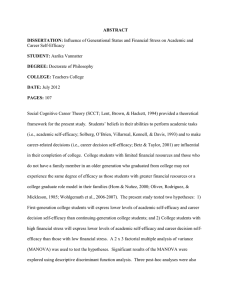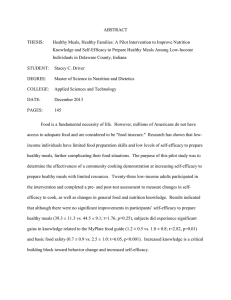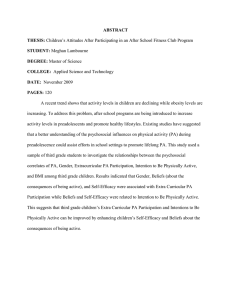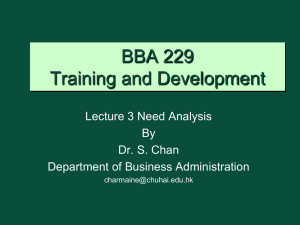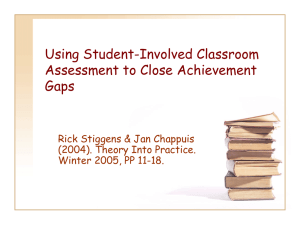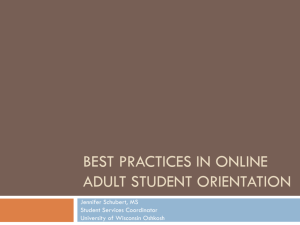Q U I C K S T A...
advertisement
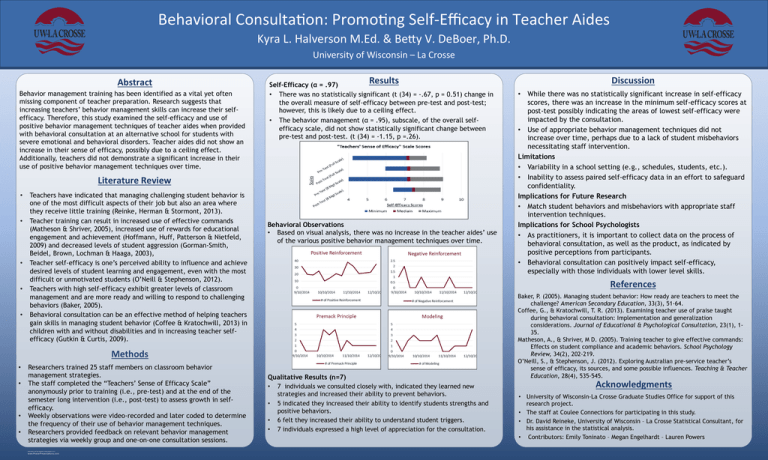
Behavioral Consulta/on: Promo/ng Self-­‐Efficacy in Teacher Aides Kyra L. Halverson M.Ed. & BeOy V. DeBoer, Ph.D. Abstract Behavior management training has been identified as a vital yet often missing component of teacher preparation. Research suggests that increasing teachers’ behavior management skills can increase their selfefficacy. Therefore, this study examined the self-efficacy and use of positive behavior management techniques of teacher aides when provided with behavioral consultation at an alternative school for students with severe emotional and behavioral disorders. Teacher aides did not show an increase in their sense of efficacy, possibly due to a ceiling effect. Additionally, teachers did not demonstrate a significant increase in their use of positive behavior management techniques over time. University of Wisconsin – La Crosse Results Self-Efficacy (α = .97) • There was no statistically significant (t (34) = -.67, p = 0.51) change in the overall measure of self-efficacy between pre-test and post-test; however, this is likely due to a ceiling effect. • The behavior management (α = .95), subscale, of the overall selfefficacy scale, did not show statistically significant change between pre-test and post-test. (t (34) = -1.15, p =.26). Literature Review • Teachers have indicated that managing challenging student behavior is one of the most difficult aspects of their job but also an area where they receive little training (Reinke, Herman & Stormont, 2013). • Teacher training can result in increased use of effective commands (Matheson & Shriver, 2005), increased use of rewards for educational engagement and achievement (Hoffmann, Huff, Patterson & Nietfeld, 2009) and decreased levels of student aggression (Gorman-Smith, Beidel, Brown, Lochman & Haaga, 2003), • Teacher self-efficacy is one’s perceived ability to influence and achieve desired levels of student learning and engagement, even with the most difficult or unmotivated students (O’Neill & Stephenson, 2012). • Teachers with high self-efficacy exhibit greater levels of classroom management and are more ready and willing to respond to challenging behaviors (Baker, 2005). • Behavioral consultation can be an effective method of helping teachers gain skills in managing student behavior (Coffee & Kratochwill, 2013) in children with and without disabilities and in increasing teacher selfefficacy (Gutkin & Curtis, 2009). Behavioral Observations • Based on visual analysis, there was no increase in the teacher aides’ use of the various positive behavior management techniques over time. RESEARCH POSTER PRESENTATION DESIGN © 2012 www.PosterPresentations.com • While there was no statistically significant increase in self-efficacy scores, there was an increase in the minimum self-efficacy scores at post-test possibly indicating the areas of lowest self-efficacy were impacted by the consultation. • Use of appropriate behavior management techniques did not increase over time, perhaps due to a lack of student misbehaviors necessitating staff intervention. Limitations • Variability in a school setting (e.g., schedules, students, etc.). • Inability to assess paired self-efficacy data in an effort to safeguard confidentiality. Implications for Future Research • Match student behaviors and misbehaviors with appropriate staff intervention techniques. Implications for School Psychologists • As practitioners, it is important to collect data on the process of behavioral consultation, as well as the product, as indicated by positive perceptions from participants. • Behavioral consultation can positively impact self-efficacy, especially with those individuals with lower level skills. References Methods • Researchers trained 25 staff members on classroom behavior management strategies. • The staff completed the “Teachers’ Sense of Efficacy Scale” anonymously prior to training (i.e., pre-test) and at the end of the semester long intervention (i.e., post-test) to assess growth in selfefficacy. • Weekly observations were video-recorded and later coded to determine the frequency of their use of behavior management techniques. • Researchers provided feedback on relevant behavior management strategies via weekly group and one-on-one consultation sessions. Discussion Qualitative Results (n=7) • • • • 7 individuals we consulted closely with, indicated they learned new strategies and increased their ability to prevent behaviors. 5 indicated they increased their ability to identify students strengths and positive behaviors. 6 felt they increased their ability to understand student triggers. 7 individuals expressed a high level of appreciation for the consultation. Baker, P. (2005). Managing student behavior: How ready are teachers to meet the challenge? American Secondary Education, 33(3), 51-64. Coffee, G., & Kratochwill, T. R. (2013). Examining teacher use of praise taught during behavioral consultation: Implementation and generalization considerations. Journal of Educational & Psychological Consultation, 23(1), 135. Matheson, A., & Shriver, M D. (2005). Training teacher to give effective commands: Effects on student compliance and academic behaviors. School Psychology Review, 34(2), 202-219. O’Neill, S., & Stephenson, J. (2012). Exploring Australian pre-service teacher’s sense of efficacy, its sources, and some possible influences. Teaching & Teacher Education, 28(4), 535-545. Acknowledgments • University of Wisconsin-La Crosse Graduate Studies Office for support of this research project. • The staff at Coulee Connections for participating in this study. • Dr. David Reineke, University of Wisconsin – La Crosse Statistical Consultant, for his assistance in the statistical analysis. • Contributors: Emily Toninato – Megan Engelhardt – Lauren Powers
